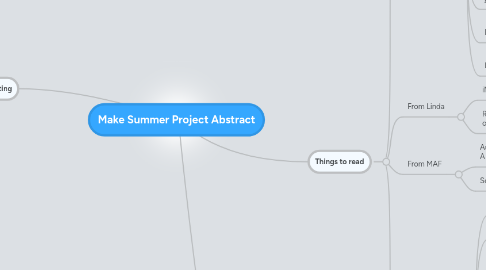
1. Start writing
1.1. Definition of terms
1.1.1. Religion
1.1.1.1. Life-as / subjective life rhetoric works here
1.1.1.2. Richard Holloway (New Statesman) take on natural vs revealed theology
1.1.1.3. Values..?
1.1.2. Spirituality
1.1.2.1. Connection to values...? Fits the subjective life better (as argued by Heelas and Woodhead) although maybe I will argue that they're preoccupied by the historical definition of religion
1.1.3. Faith / Dogma
1.1.4. Worship
1.1.4.1. Argue it is "practice"
1.1.5. Empathy.........
1.2. Get 5 dictionary definitions to demonstrate the spread between them......
1.2.1. What do these definitions describe and what don't they (for instance does Buddhism, Scientology, Christianity, TM, all fit in? What about superfans.....
2. From Emma
2.1. http://www.cultdyn.co.uk/ - differing approach to the Common Cause people (Pat Dade) Also see: http://globalcoolfoundation.org/tag/pat-dade/
2.2. Contacts I can make (that Emma knows) if needs be
2.2.1. http://valuesandframes.org/author/tom/ - Tom
2.2.2. [email protected]
3. Things to read
3.1. From Lynne
3.1.1. Values & Frames
3.1.1.1. Common Cause Handbook
3.1.1.1.1. Can definitely use the circumplex and diagrams to help guide how I construct the "Builder" part of the app
3.1.1.1.2. Potentially make this project actually about frames in their own right. Does the same app presented as a 'values toolkit' have different outcomes as it presented as a 'DIY religion' ...?
3.1.1.1.3. Use the logic of how different values interact and oppose one-another as a core for arguing wellbeing can be value-based then build an individuals value system, that through practice may become spirituality
3.1.1.2. Finding frames (Global poverty thing)
3.1.1.3. Publication on cultural values
3.1.2. European Social Survey (Particularly how it relates to Schwartz)
3.1.2.1. Very good arguments, need to find the COUNTER arguments if I'm going to use it (for a limitations section)
3.1.2.2. In chapter 7, the argument is constructed around how these questions can gauge values across ALL of Europe, why not use this to help my users construct their belief system?
3.1.2.3. It looks like it links well to establishing 'actions' or 'practice' or 'worship' too ---- need to reconcile the construction of the survey with my own definition of spiritualism or religion.
3.1.3. Lillypad model, etc (several links)
3.1.3.1. Use lilypad and iceberg to suggest that by some exploration at the fringes of what we KNOW, we might tweak, effect, tune, or align things that are more deeply routed and that maybe we DONT know. ACCEPT THE LIMITATIONS THOUGH
3.1.4. Civil service thing (p11-15 (esp p14) of http://www.civilservice.gov.uk/wp-content/uploads/2011/09/Behaviour_change_reference_report_tcm6-9697.pdf)
3.1.5. IF campaign
3.1.5.1. I think I don't want to align with IF in a direct way - gut feeling
3.1.5.1.1. Maybe because I think causes like IF are (in S Walker talk) an ends, not a means. I'm more interested in exploring the universal means.
3.1.6. Lynne's dissertation
3.2. From Linda
3.2.1. iMuslim (Gary Bunt)
3.2.2. Religion Online: Finding Faith on the Internet (IN LIBRARY)
3.3. From MAF
3.3.1. Automatic Confession Machine: A Catholic Turing Test (2012)
3.3.2. Sceptics in the pub & secular humanists
3.4. Other sources
3.4.1. The Spiritual Revolution
3.4.1.1. Ch1: "Religion asks you to learn from the experiences of others. Spirituality urges you to seek your own"
3.4.2. New Statesman (22-28 March 2013)
3.4.2.1. Alain de Botton
3.4.2.1.1. Good quotes about taking the 'good things' from faith
3.4.2.1.2. Nice analogy of priest vs therapist: branding
3.4.2.1.3. Academia is killing our ability to use culture as the new gospels (?)
3.4.2.1.4. Museums and galleries, could be the new churches in a secular world (interesting resonance with curation things...)
3.4.2.2. Francis Spufford
3.4.2.2.1. Interesting opposition to the 'puritanical' new atheists like Dawkins
3.4.2.2.2. "Having abandoned the impossible task of trying to abolish religion, atheists might be able to apply themselves to the rather more useful task of distinguishing between kinds that you want to damn you and kinds that you don't"
3.4.2.3. Jim Al-Khalili
3.4.2.3.1. Atheists are mainstream
3.4.2.3.2. Time for "New, New Atheists"?
3.4.2.3.3. Some would call him - being tolerate of religion - an "accommodationist" he calls it "Humanist"
3.4.2.4. Karen Armstrong
3.4.2.4.1. Our concept of God is a starter kit, why don't we build on it?
3.4.2.4.2. God/Santa comparison - we develop our ideas of santa, but not God!
3.4.2.4.3. Religion as PRACTICE
3.4.2.4.4. Attaining ekstasis (stepping outside)- achieved through ACTIONS and PRACTICE
3.4.2.4.5. Clarification of the word FAITH, how it changed from commitment toward dogmatic belief in "dubious propositions"
3.4.2.5. Richard Holloway
3.4.2.5.1. Comparison of natural theology (a continuum, very philosophical, something that Dawkins and Scruton can sit on at the same time) and "Revealed" theology, didactic
3.4.2.5.2. Issue of circular arguments.... (can be negated through my system)
3.4.2.5.3. What assumptions are useful if you assume holy texts were written by people,,,, mythology, how eg, Easter services tap into our innate desire to believe that good isn't always defeated by evil
3.4.3. Spiritual Sat Nav (http://www.telegraph.co.uk/technology/news/10048675/Spiritual-sat-nav-launched-for-British-history.html)
3.4.4. Bible as textbook? http://www.gransnet.com/forums/science/1198306-Steve-Jones-webchat-15-May
3.4.5. Continuum film... http://vimeo.com/55073825
3.4.5.1. Sudden change in wordview
3.4.5.2. Is it beyond metaphysics (see overview institute bookmark) and a REAL change of perception?
3.4.5.3. What I can I learn from it?
3.4.6. OU - Studying Religions
3.4.6.1. Links to the enlightenment
3.4.6.2. All the terms are made up by Europeans, for our own purposes in 18th + 19th centuries
3.4.6.3. Notes that a definition should be specific, flexible and non-prejudice'd
3.4.6.4. definition functional/substantive etc
3.4.6.4.1. ‘a system of beliefs and practices by means of which a group of people struggles with the ultimate problems of human life’ (Yinger, 1970, p. 7).
3.4.6.4.2. Football example
3.4.6.4.3. Religion, then, consists of beliefs, actions, and institutions which assume the existence of supernatural entities with powers of action, or impersonal powers or processes possessed of moral purpose. (Bruce, 1995, p. ix)
3.4.7. Non-linear dynamics..... could religion die out? Maybe this resonates with the New Statesman stuff.... new ways required to conceptualise it: http://www.bbc.co.uk/news/science-environment-12811197

